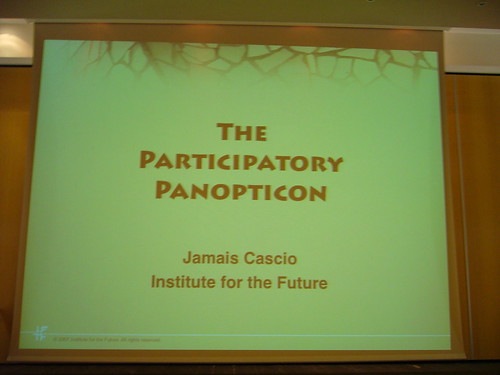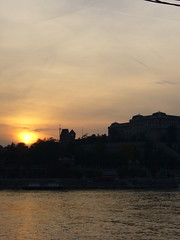Visions of the Future conference, Budapest
 The point of my trip to Budapest, the Visions of the Future conference brought together representatives from two different Hungarian technology institutions and representatives from the Institute for the Future: research directors Alex SK Pang and Anthony Townsend, along with me. Alex and Anthony discussed some of their current Institute projects, while I -- for the third time in as many weeks -- presented the overview of the 2007 Ten-Year Forecast. I also got a chance to give an updated version of my Participatory Panopticon talk.
The point of my trip to Budapest, the Visions of the Future conference brought together representatives from two different Hungarian technology institutions and representatives from the Institute for the Future: research directors Alex SK Pang and Anthony Townsend, along with me. Alex and Anthony discussed some of their current Institute projects, while I -- for the third time in as many weeks -- presented the overview of the 2007 Ten-Year Forecast. I also got a chance to give an updated version of my Participatory Panopticon talk.
(I know that Alex and some of the conference folks took pictures during the talk; when I have links, I'll add them.)
For both of my presentations, I went entirely script-less. I don't do this often; I have a writer's appreciation of language precision, and while the way I speak bears a close resemblance to the "voice" of my writing, I know that my scripted presentations end up with a more powerful narrative. Unfortunately, memorization of the scripted pieces is usually not an option, so I end up having to read the presentations. This actually works out reasonably well, but it does reduce my contact with the audience. Because of this -- and because I'm told that I speak more slowly when I'm extemporaneous rather than scripted -- I'm now making more of an effort to go naked (verbally, at least).
 Budapest is an interesting city. Most of the guides make a point of mentioning that people (guide-writers, at least) call it the "Paris of the East." This is actually not an unreasonable description: with a mid-city river, a mix of historic and modern architecture, and a rich cultural tradition, Budapest does have a Parisian aura. Café culture isn't at a Parisian level, but it's certainly more developed than (say) London. (The fact that Starbucks has yet to make it to Hungary may have something to do with that.)
Budapest is an interesting city. Most of the guides make a point of mentioning that people (guide-writers, at least) call it the "Paris of the East." This is actually not an unreasonable description: with a mid-city river, a mix of historic and modern architecture, and a rich cultural tradition, Budapest does have a Parisian aura. Café culture isn't at a Parisian level, but it's certainly more developed than (say) London. (The fact that Starbucks has yet to make it to Hungary may have something to do with that.)
I'm heading home tomorrow, and amidst the overly-adventurous menus and consultant shmoozery, I think the most memorable moment was a quiet conversation at dinner last night. Speaking with one of the young conference organizers, he told me about the moment 18 years ago when, sitting in a classroom, he listened to a live broadcast of the Hungarian leader's announcement that Hungary had become a republic, and was no longer a de-facto dictatorship. The classroom erupted in cheers, only to fall silent when the teacher asked, simply, "how do you know it will be better?"
As ten-year-olds, they had no answer, but I do have one:
They don't -- but they know, better or worse, it will now be their choice.






Comments
That menu is awesome.
Posted by: Howard Berkey | October 6, 2007 9:34 PM